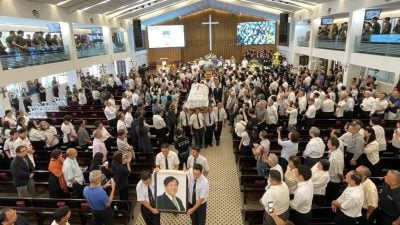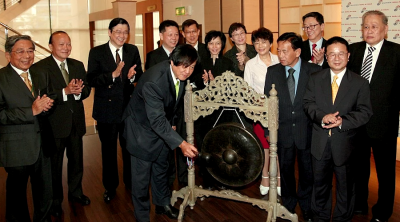
By Lim Sue Goan, Sin Chew Daily
The Kimanis by-election is not just about a single parliamentary seat. There is tremendous political significance in BN's victory there.
First of all, the Sabah Umno gets a much needed boost. Umno not only lost the state after the 2018 general elections, the party also lost 16 state seats and six parliamentary seats in addition to two senators and 22 divisional chiefs. The exodus tide almost paralyzed the state Umno, not to mention the departure of several state BN component parties, including PBS, PBRS and USNO that sent the state BN on the brink of collapse.
Thanks to the strong leadership of Sabah chief minister cum Warisan president Shafie Apdal and powerful support from the federal government, many former Sabah BN leaders began to lean towards the new state government. As a result, the state Umno is left with a single MP, i.e. Bung Moktar Radin (Kinabatangan). Sabah Umno is seen as hopeless in making a remarkable comeback any time soon.
Nevertheless, the victory in Kimanis shows that Umno still retains much of its support among the people in the state.
Through earlier by-elections in Peninsular Malaysia, Umno and BN have proven that they still have the support of majority of Malay voters. The Kimanis victory shows that BN is on the right path of a full recovery. Not only will the victory check any further drain but may even get those who have left to return to the party.
PH and Warisan are poised to face a major rival that is coming back in a big way.
Secondly, the opposition has found the right solution to deal with PH and Warisan. The Muafakat Nasional between Umno and PAS has been proven effective in West Malaysia as evidenced by the several by-election wins on the peninsula. The one-on-one tactic minus vote dilution works very well, and now the cooperation among opposition parties in Sabah is firming up the assumption.
Sabah has a large number of localized parties each with its own scope of influence. The ruling coalition is set to benefit from a multi-cornered fight. In Kimanis, these local opposition parties not only pulled out from the race but also campaigned for BN, including former PBS president Joseph Pairin Kitingan who still wields powerful influence among non-Muslim bumiputras in the state.
If the opposition parties in the state are willing to put aside their differences and form a single opposition alliance, the Warisan state government could come tumbling down any time.
Meanwhile, PPBM leaders have campaigned fervently for the Warisan candidate to show that there are no conflicts between the two parties. Unfortunately, PPBM lacks grassroots influences in the East Malaysian state.
Thirdly, dissatisfaction towards PH has now spread to East Malaysia. The opposition in Sabah has been making a big issue about the Sabah Temporary Pass (PSS) which has touched the nerve of many a non-Muslim bumi in the state, causing Warisan to lose non-Muslim support.
As a result of huge influx of Muslim migrants during the 1992-1995 "Project IC" campaign, Muslim voters outnumbered non-Muslim voters in the state for the first time. As if that is not enough, the redelineation exercise has caused non-Muslim bumis to surrender their political dominance. With Mahathir now back as prime minister, the PSS initiative once again reawakens the painful memories of Sabah's non-Muslim communities.
In addition, Chinese voters have largely shifted their support from Warisan to BN in Kimanis, showing that Sabah Chinese, like their counterparts elsewhere in the country, have felt the unfair policy of the PH government.
With the initial halo now beginning to fade, PH's prospects of winning the upcoming Sarawak state election is dim. PH's bruised credibility may not win it the trust and faith of Sarawak's voters.
Fourthly, PH will have a hard time shedding its "one-term government" fate. The ruling coalition lost five of the last six by-elections and the PH administration may very likely be reduced to a lame duck government if such "one-term government" perception becomes a consensus.
And since the PH coalition will only have three more years to run the country, it is understandable for some civil servants to not obey the instructions of the PH government while business organizations may have little faith that the government could come up with any long-term business-friendly policy, forcing them to hold back their investment plans and adopt a wait-and-see attitude, hence a continuously depressed economic climate.
The biggest reason for the trust deficit is PH leaders' fear to lose the power and therefore not carry out the pledged reforms. Such mentality will develop into a vicious cycle, as their fear after losing one by-election will make them lose more in the next election.
It has been reported that some education officials have attempted to overturn earlier reforms, including the reinstatement of the Universities And University Colleges Act, after Maszlee Malik's resignation. If the report is substantiated, PH will once again renege on its election promises.
Institutional Reform Committee (IRC) member Ambiga Sreenevasan has warned to take to the streets again if real reforms are not delivered by June this year. PH's demise will be expedited if civic organizations now turn against the PH.
PH leaders are busy with distributing cash to the people, not unlike what former PM Najib Razak did. If the strategy ever worked, the BN administration would not have been brought down in the first place!
Meanwhile, PKR is still very much embroiled in infighting while DAP is seen as largely detached from the people. PH can get ready to wind up its business if the coalition still sticks to its existing modus operandi.
ADVERTISEMENT
ADVERTISEMENT


































